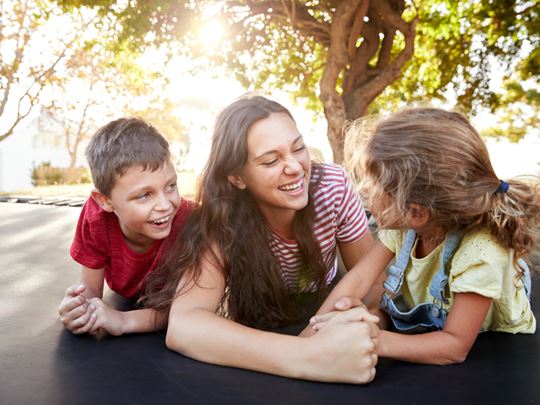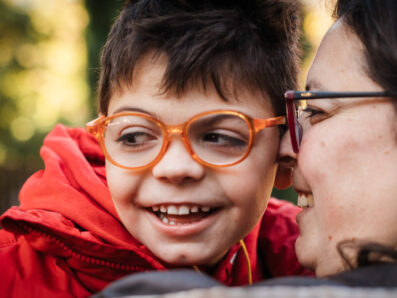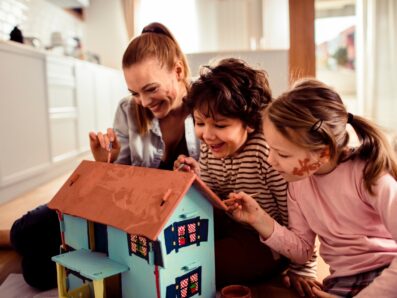The decision to foster when you have birth children in the house is one that demands a lot of thought. These are your young people that will be asked to navigate all that comes with having a foster child live with you. Fostering can be a major, positive experience for birth children and their parents too.
Just like the children who you care for, your birth children’s brains are still developing and their surroundings are a big part of this development journey. It is easy to focus on the things that might be challenging, but why not instead consider this list of life lessons that your children could learn through your decision to foster?

1. How to Really Share
When you become a foster parent, your child will learn more than just how to share their toys and possessions. Though there is a lot of value in maintaining boundaries with personal belongings for both the birth children and the children in your care, there will be some crossover that occurs either organically or as an enforced necessity. Acquiring the ability to share is something every person has to work through. It is not always straightforward, and it takes a long time for it to become an established pattern of behaviour. However, fostering will help with this on several levels.
-
Their Space
The very act of welcoming a child into your home will open up the door for your birth child (or children) to discover how to share their space. Personal space sharing is essential for young adults who move out on their own into multi-person accommodations such as university halls, for instance. It will teach them how to navigate another person needing to use their bathroom, kitchen, and recreational zones like the living room area as well. This might be tough at first, but over time it becomes easier, especially as the bond grows too. For birth children who have siblings, this may feel like more of a natural step compared to single child households where an initial struggle may be more apparent.
-
Their Family
Further to this is the fact that they will be sharing their family members too. This is not just the parent figures in the household, as it usually extends to the wider unit as well, and even social circles in some cases like their friends and close acquaintances. Being able to establish healthy relationships is an essential life skill. It will help mitigate and explore jealousy, possessiveness, and even sometimes anger.
2. Responsibility
The role of foster parents is a varied one. There are lots of additional responsibilities to figure out, some of which will involve your birth children. What they learn from this is how to be responsible for themselves from the example you set.
The opportunity is there for them to take more control over their personal routine, for example, getting ready for the day at school or sitting down to complete home learning tasks. Teaching children how to be responsible for their own agendas is the ultimate goal as a parent, and choosing to foster can help with this.

3. More Refined Self Identity
Empowering young people and children to find their self identity is invaluable. Every child should be given an arena in which they are able to discover who they are, where their core values lie, and the kind of person they want to be when they become an adult. Fostering will boost this process exponentially. They not only get to learn about different backgrounds and upbringings but discover new people from all walks of life as they navigate the journey by your side. This will help them understand more about where they come from and what makes them unique too.
Why is this important?
Children who know who they are from the inside out understand how to challenge themselves and grow in healthy ways. They come to accept their weaknesses and strengths and use them in positive channels to build their life through the lens they’ve always envisioned. It will bring them clarity in all their future relationships and bolster their instincts as they navigate the hard times.
4. Empathy
Empathy is one of those things that people often struggle with in certain contexts. Caring for a child who has experienced a very different childhood to your own birth children will expose them to a different way of living. The child that comes into your home is unlikely to have a similar profile to the one they have grown up with. There will be trauma in some cases to work with and this alone is enough to create a new empathetic way of looking at the world. Children rarely leave their birth home for nice reasons, and while it is not always appropriate to share these details (and it should be above all at the discretion of the foster child and social worker), there will be bits and bobs of information that are relevant for contextual purposes.
Empathy is a vital skill because it enables self-regulation, shapes relationships, strengthens connections, and teaches people how to care appropriately in the best of ways.

5. A Wider Perspective
When the time comes to leave home and live more autonomously, the experience as a part of a family that fosters will help. Thanks to the wider perspective of life that fostering gives, birth children will feel more confident to tread more paths in their own life too. Seeing the world through different stories is not something that can ever be dismissed. It shows them other circumstances, opens their mind to alternative viewpoints and lifestyles, and creates a strong affirmation that there is more to life than the four walls they grow up in. The world is a big place filled with billions of people they’ve yet to meet. Showing them that there is more out there can never be a bad thing for a parent to do.
6. Appreciation
Fostering will also give your child a unique viewpoint into their own existence. It will help them appreciate their life for what it is and detract from those ever-present moments that everyone has where they might take things for granted. Of course, they will still happen. Yet, with the additional frame of reference of their part in a foster cycle, children will be better equipped to hold onto what they have dearly and see it as a wonderful advantage.
7. Friendship and Social
Friendships and social relationships are tricky things to figure out. There will always be bullying, fall-outs, and difficulties but the flipside of this is that fostering helps represent friendship in a new light. The potential for a strong bond to be built is a very tangible thing. Social skills are also irreplaceable. It is quite often a barrier for a variety of people to work through, but the chance you are giving them to do this in a safe space where they feel in control will only do wonders for their self-esteem and general confidence in this area. Everyone deserves relationships that they can trust and spaces to feel safe and like they can be themselves. Building this in their own home will do more than you can ever know.
Birth children have a unique stance in the fostering family. They may feel displaced or even worried about a parent’s decision to go down this route, but that is why highlighting all the value is essential.
Other articles you may like
Ready to start your fostering journey?
By Phone
One of our team is available to talk to you over the phone to answer any of your fostering queries.
By Email
You can get in touch by filling out our online enquiry form with any queries that you may have.
Visit an office
We have local teams covering most of England. Find your local office today.





